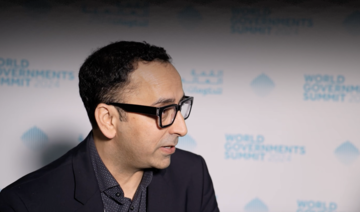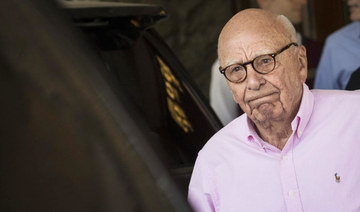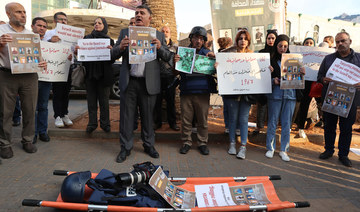DUBAI: Tech-focused new media company Step held its 12th annual conference and exhibition in Dubai last week, which attracted about 350 startups, 150 venture capital firms and more than 8,000 delegates.
Ray Dargham, the co-founder and CEO of Step, said during the opening ceremony that the business, which has already expanded to include a conference in Saudi Arabia, now plans to go global through a partner-hosting model.
The event in Dubai featured six tracks: Start, covering startups, growth and venture capital; Fintech, covering ecommerce; Digital, devoted to media, adtech and creators; Wellness, covering health, lifestyle and femtech; Earth, for greentech and sustainability; and Artificial Intelligence, covering machine learning, data and automation.
The newly added AI track covered topics such as large-language models, advanced neural nets, and co-pilot systems, which were discussed by industry experts such as Brittany McDonough of the Abu Dhabi Investment Office; Maitha Alsuwaidi, chief operating officer of Microsoft UAE; Google Cloud’s Ahmad El-Sayed; and Google Deepmind’s head of product, Mehdi-Ghissassi.
Although AI has been around for a while, “it hadn’t actually reached a critical mass until about a year ago,” Dargham told Arab News. “For a long time, AGI or artificial general intelligence, was mostly limited to labs.”
More recently, ChatGPT has played a critical role in helping AI reach a mass audience, allowing everyone to “experience the power behind the technology,” he added.
The AI sessions at the Step Conference, which covered several topics, including regulatory frameworks and deep learning, were “designed to provide startups with invaluable insights into the ethical, regulatory and technological advancement of AI, equipping them to navigate and capitalize on the dynamic and fast-moving landscape of AI-driven innovation.”
The company is adapting to become an “AI conference” because, Dargham said, “most of what we consider ‘tech’ today will become AI-powered or have an AI component to it over the next few years.”
All of the other tracks during Step events will be affected by the development and utilization of AI to such a significant degree that Dargham believes the technology “will become bigger than software and the internet itself. Hence, theoretically speaking, our conference will become an AI conference instead of being a tech conference.”
Much of the innovation and development in AI has been global but Dargham said that in particular, Step was “noticing a significant shift in the Middle East region toward a growing interest and adoption of generative AI technologies.”
As evidence of this he cited the UAE’s strategy on AI, which aims to ensure the country is at the forefront of innovation in the technology by 2031, and Saudi Arabia’s national agenda for data and AI, which aims to position the Kingdom as a global leader in data-driven economies, allowing it to leverage the power of AI for economic and social development.
The region is already receiving greater international attention and investment related to AI. OpenAI CEO Sam Altman, for example, is reportedly in talks with investors, including in the UAE, to raise funding — said to be as much as between $5 trillion and $7 trillion — for a tech initiative to boost international chip-building capacity and expand its ability to power AI, among other things.
Saudi Arabia and the UAE “are leading a groundbreaking wave of AI investment, spearheaded by entities like (AI development company) G42,” said Dargham.
“The adoption rates are skyrocketing across sectors, from healthcare to finance, highlighting a strategic shift towards AI-driven innovation” but it isn’t “just about numbers,” he added.
“It’s about crafting a narrative of ambition and progress that’s reshaping the region’s technological landscape.”
The national strategies of the countries and their investments are encouraging interest from private entities that “are increasingly investing in AI research and development, with a particular focus on generative AI,” which includes “endeavors to pioneer advanced algorithms, models, and applications customized to address regional needs and challenges,” said Dargham.
AI innovation is particularly evident in the startup landscape, with businesses “exploring diverse applications of generative AI in areas such as natural language processing, computer vision and creative AI.”
The advancement of AI is not without its challenges as global concerns grow about data privacy and security.
“Ensuring the protection of sensitive information and compliance with data-protection regulations are imperative for instilling trust and confidence in GenAI technologies among stakeholders,” said Dargham.
He added that “a significant hurdle” is the shortage of skilled AI professionals.
“Without an adequate talent pool equipped with the necessary expertise, organizations struggle to effectively implement GenAI solutions” resulting in a “pressing need to invest in AI education and training programs,” he said.
The rapid development of AI also brings with it ethical considerations.
“From deepfakes to misinformation, the ethical implications of GenAI demand robust guidelines and frameworks for responsible use,” Dargham said.
Step is committed to playing its part in this space, he added, through sessions designed to address the ethics, safety and societal impacts of AI. It is also exploring collaborations between governments and international organizations “to develop policies that foster innovation while addressing concerns related to data privacy, bias, transparency and responsibility.”
While regulation is critical, Dargham cautioned against over-regulation.
“Collaboration with policymakers, industry leaders, and ethical experts is essential in establishing clear guidelines that promote the ethical deployment of GenAI technologies, fostering trust and accountability within the ecosystem,” he said.
Both Saudi Arabia and the UAE have “made significant progress in crafting frameworks for AI governance and ethics,” accompanied by national strategies and programs “aimed at advancing AI technologies while addressing pertinent regulatory concerns,” Dargham added.
“I think regulation for AI is crucial, but I’m also concerned about over-regulation globally; the EU tends to overregulate.”































